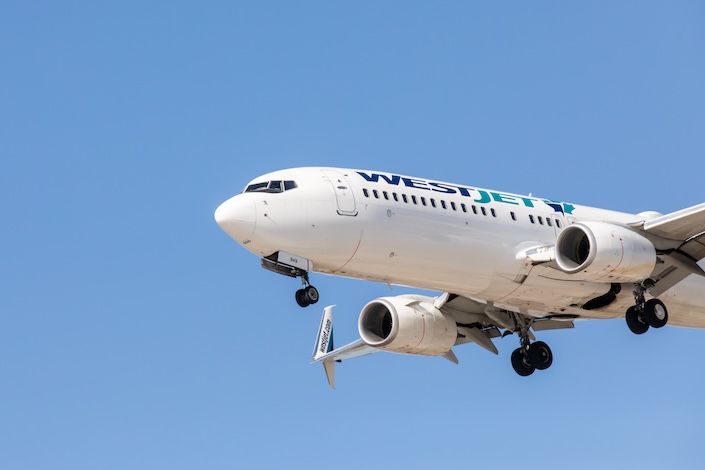Where travel agents earn, learn and save!
News / WestJet CEO apologizes for accessibility failures, defends airline’s record
“To our guests who didn’t have a good travel experience with us, we are sincerely sorry, and we are committed in doing better”

WestJet chief executive Alexis von Hoensbroech apologized for incidents where the airline failed to accommodate people living with disabilities, saying he hopes to improve travel accessibility.
“To our guests who didn’t have a good travel experience with us, we are sincerely sorry, and we are committed in doing better,” von Hoensbroech said during a House of Commons transport committee hearing on accessible transportation on Thursday.
More than 99.9 per cent of the carrier’s 260,000-plus customers who required support last year — roughly 700 each day, the vast majority of whom used mobility aids — had a good experience, he said.
“Every case that goes wrong is one too many,” the CEO said.
The appearance followed a committee hearing last week that saw lawmakers take Air Canada CEO Michael Rousseau to task over “shocking” failures around accessibility.
Rousseau acknowledged mistakes, and pointed to an expedited accessibility scheme announced in November along with new measures to improve the travel experience for hundreds of thousands of passengers living with a disability.
Multiple incidents have surfaced at Canadian airlines over the past year.
A B.C. man with spastic cerebral palsy was forced to drag himself off of an Air Canada plane in Las Vegas. Canada’s chief accessibility officer Stephanie Cadieux arrived in Toronto to find the airline had left her wheelchair behind in Vancouver. Former Paralympian Sarah Morris-Probert hauled herself up WestJet aircraft stairs rather than being able to board using her wheelchair.
“Everyone’s always very sorry and very committed to doing better whenever these things happen, but these high-profile incidents continue to plague Canadian airlines,” Conservative MP Mark Strahl told von Hoensbroech.
“Thoughts and prayers are no longer acceptable.”
Von Hoensbroech highlighted steps WestJet is taking to boost accessibility. These include a process to confirm to customers that mobility aids were loaded into the cargo hold and procedures to properly store those devices on board across its whole network. Both measures are set for rollout “very soon,” he said, on top of plans for clearer communication about what flights cannot accommodate mobility aids beyond a certain size.
Advocates insist tougher rules and enforcement are needed to reduce accessibility barriers.
“As a blind passenger, I dread entering Canadian airspace, because I never know how good or bad will be my treatment,” David Lepofsky, a lawyer who chairs the Accessibility for Ontarians with Disabilities Act Alliance, said in a Wednesday news release.
“Month after month, the media has reported on inexcusable and recurring incidents where an airline loses or destroys a passenger’s wheelchair, leaves a passenger with disabilities to crawl off an airplane, or strands a passenger with disabilities for hours in a Canadian airport without needed assistance.”
Current regulations codify important principles but fail to spell out financial consequences forbreaches, said Gabor Lukacs, president of the Air Passenger Rights advocacy group.
“The culprit is the perennial problem of inadequate enforcement and inadequate legislation,” he told the committee.
Penalties against large airlines over disabilities violations occasionally top $100,000. “However, when the media is not paying attention, the fines are insignificant,” Lukacs said.
Last week, the Canadian Transportation Agency penalized Air Transat to the tune of $11,000 after it failed to quickly provide a suitable replacement for a passenger’s mobility aid that had been lost on arrival in Venice. Airline owner Transat A.T. Inc. took in $3 billion in revenue last year.
The agency’s enforcement team tracks complaints to scan for a pattern of contraventions, and looks to impose fines when it sees a problem as “systemic,” Tom Oommen, the agency’s director general of analysis and outreach, said in an interview last month.
Lukacs also called for a government mandate to collect and post statistics on disability-related complaints and mishandled mobility aids, as the U.S. Department of Transportation does, and which von Hoensbroech said he would support “100 per cent.”
WestJet received and investigated about 200 complaints related to accessibility last year, some involving damage to mobility aids — “quite small numbers relative to the very large amount of passengers with (disabilities) that we carry,” said Todd Peterson, the airline’s head of regulatory affairs.
NDP MP Taylor Bachrach cited WestJet incidents where mobility aids were left behind, a passenger was picked up, dropped and injured because staff weren’t comfortable with the lift device, and the wheelchair rim of a four-year-old with spina bifida was damaged, rendering her immobile formore than a month.
“WestJet’s CEO said some of the right things, but there’s very little transparency required by the current regulations,” Bachrach said in an interview.
“It shouldn’t be up to airlines to voluntarily share data.”
He called on the federal government to back stricter rules and a crackdown by regulators, who he said remain “reluctant to levy fines” that are big enough to deter breaches.
One area of possible reform is to expand the one-person-one-fare rule to international flights from domestic ones, where it has been required since 2020. The policy ensures passengers who need an attendant or service dog pay for only one ticket.
Von Hoensbroech took pains to stress the complex, integrated nature of air travel.
“If someone books a WestJet ticket but it is operated on an Air France flight — and Air France doesn’t have this type of rule — then this creates confusion,” he said, arguing that rules must be consistent between jurisdictions.
However, critics say Canada has every right to set the standards on flights booked for Canadian airlines, regardless of whether one leg is operated by a foreign carrier.
As for the case of the ex-Paralympian, airport congestion in Los Cabos, Mexico, meant that the plane was forced to park on the tarmac rather than at the gate, leaving stairs as the only way to board given the airport provided no ramps. Crew members had offered to carry Morris-Probert into the aircraft in her wheelchair, but the ex-Paralympian considered that option dangerous, von Hoensbroech said.
“There’s an approved process on how to do it,” he said, but called her experience “humiliating” nonetheless. “I don’t like that either, but it was the next best option.”
Source: Travelweek











